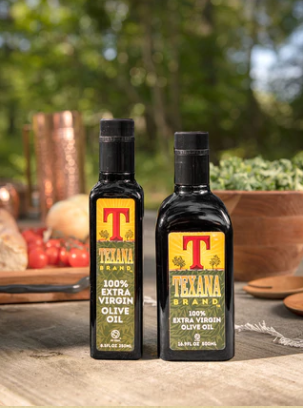
Are Olive Oil and Vegetable Oil the Same Thing? Understanding The Difference
Texana BrandsShare
When looking for the perfect cooking oil, you have an endless amount of available options. Out of the many available options, olive oil and vegetable oil are the most popular.
But are olive oil and vegetable oil the same thing? The short answer is no. They are very different!
At Texana Brands, our professional olive oil producers and distributors want to help clear up any confusion regarding these cooking oil products.
In this blog, our team will discuss:
- What olive oil is
- What vegetable olive oil is
- Olive oil and vegetable oil differences
- What makes olive oil the healthier option
- Why choose olive oil instead of vegetable oil
- Substituting olive oil for vegetable oil

Table of Contents:
- What is Olive Oil?
- What is Vegetable Oil?
- Olive Oil and Vegetable Oil: The Difference
- What Makes Olive Oil the Healthier Option?
- Why Choose Olive Oil Instead of Vegetable Oil?
- Substituting Olive Oil for Vegetable Oil
- Conclusion
People Also Ask:
Can you use olive oil instead of vegetable oil?
Yes! Medical and nutritional experts recommend substituting olive oil for vegetable oil whenever possible. This is because olive oil is a much healthier alternative as vegetable oil is highly processed.
What oil can replace vegetable oil?
Olive oil. Olive oil, especially extra virgin olive oil, is the healthiest plant oil you can buy. It is also highly versatile, making it ideal for all cooking and baking.
What is Olive Oil?
Olive oil is the liquid that is produced once it has been extracted from fresh, whole olives. The olives are pressed by machine to minimize the exposure to air and light.
This liquid dietary fat has been around for centuries and is still widely used for many purposes today.
Common olive oil uses can include:
- Cooking (baking, sautéing, marinating, etc.)
- Fueling lamps
- Skin and health benefits
- Pharmaceutical purposes
- Cosmetic product ingredient
What is Vegetable Oil?
Vegetable oil is the liquid extracted from seeds such as rapeseed, soybeans, and cocoa butter. Other common vegetable oil sources include sunflower, corn, sesame, hazelnut, peanut, and grape seed.
Olive Oil and Vegetable Oil: The Difference
While both are recognized as culinary oils, olive oil and vegetable oil differ.
- Olive Oil is the oil extracted directly from the olive fruit and is considered one of the healthiest cooking oils you can buy. Olive oil is flavorful and versatile, making it a popular choice for endless cooking uses. The culinary uses for olive oil include making marinades, salad dressings, sautéing and roasting vegetables, searing and more!
- Vegetable Oil is a neutral cooking oil derived from grains, seeds, nuts, and fruit. Products labeled as "vegetable oil" include canola oil, sesame oil, grapeseed oil, peanut oil, and more. These ingredients are often recommended for high heat searing and cooking rather than consuming it raw or as a salad dressing.
Bottom line: When looking for a flavorful, versatile, and healthy cooking oil, olive oil is the best choice. Not only is it ideal for cooking, but olive oil has many proven health benefits.
What Makes Olive Oil the Healthier Option?
Olive oil is healthier than vegetable oil, but why is that? It's because olive oil is naturally packed with healthy monounsaturated fats, minerals, polyphenols, and antioxidants.
Many medical studies have shown that olive oil can have beneficial effects on the heart and skin. It also has proven to have anti-inflammatory and anti-bacterial properties.
Click here to check out our blog discussing the health benefits of olive oil!
Why Choose Olive Oil Instead of Vegetable Oil?
While both olive oil and vegetable oil contain healthy fatty acids, the amounts found in olive oil greatly surpass those in vegetable oil. Additionally, olive oil is extracted from fresh-pressed olives only and is made without chemicals, heat, or dyes.
Vegetable oil is made by mixing a variety of different oils. Because of this, making vegetable oil requires more processing to help remove impurities and create a neutral flavor.
Substituting Olive Oil for Vegetable Oil
Whether you want to cut down your calories or want a healthier cooking alternative, our team at Texana Brands has got you covered!
Here are some helpful tips and easy ways to substitute olive oil for vegetable oil:
- Sauté to make your favorite dish tastier and aromatic
- Improve your salad dressings
- Bake for a healthier dessert, pastry, or bread
- Roast instead of deep-fry
- Drizzle over pasta
Conclusion
If you’re looking to add plant oils into your diet, olive oil is the healthier choice when compared with vegetable oil. Extra virgin olive oil retains several trace vitamins and minerals that benefit your health and diet.
When cooking, try substituting some of your usual vegetable or seed oils for this healthy alternative!
Are you looking to add olive oil as a staple in your kitchen?
Click here to shop Texana Brands signature olive oil products!
